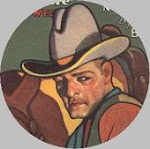Western stories probably covered more magazine pages with ink than any other sort of story. Even before the dime novels focusing on the fictionalized heroics of Buffalo Bill and Jesse James, there were the so-called “almanacks” carrying tall tales about Davy Crockett. Around the turn of the 19th to the 20th Century the dime novel format evolved to that of the pulp magazine. The general interest fiction magazines like Munsey’s and Argosy carried western stories, but the magazines dedicated to western fiction also had their places, with Street & Smith’s Western Story Magazine perhaps the best known.
There were many, many pulps devoted solely to western fiction -- some general western magazines, such as S&S Western Story Magazine and Dime Western, and others that took a cue from the hero pulps, like Pete Rice Western, Rio Kid Western, and Texas Rangers magazine. And westerns also appeared in magazines like All-Story, Adventure, Argosy, and Blue Book. In fact, one of the longest-lasting pulps was a western: Ranch Romances, which finally ended its run in 1971.
Popular contemporary authors had their career starts in these publications -- among them Elmore Leonard, Louis L'Amour, and Elmer Kelton. And classic western writers who remain in high regard today, had work first published on pulp paper -- Zane Grey, Max Brand, Les Savage, Luke Short, and many more.
The appeal of the west to a popular audience began with the dime novels in the second half of the 19th Century. These featured heroes based on historical figures -- Wild Bill Hickok, Kit Carson, Buffalo Bill, and so on -- but you can be sure that their fictional exploits took great license with the actual facts of their real-world counterparts' lives.
The appeal of the western story did not diminish with the growth of the new century. Readers continued to appreciate stories of good versus bad in a frontier setting, even as the real world exploded into war, sank into economic depression, and marched to war again. Year after year, new writers churned out new stories based on the old themes to fill issue after issue of pulp paper magazines and eventually slick-paper magazines, such as Colliers and Saturday Evening Post. From the pages of the latter publication came stories that were the basis of some classic movie westerns: The Searchers by Alan LeMay, Blood on the Moon by Luke Short. Although fewer western movies are made these days, the western still resonates in the mind.





